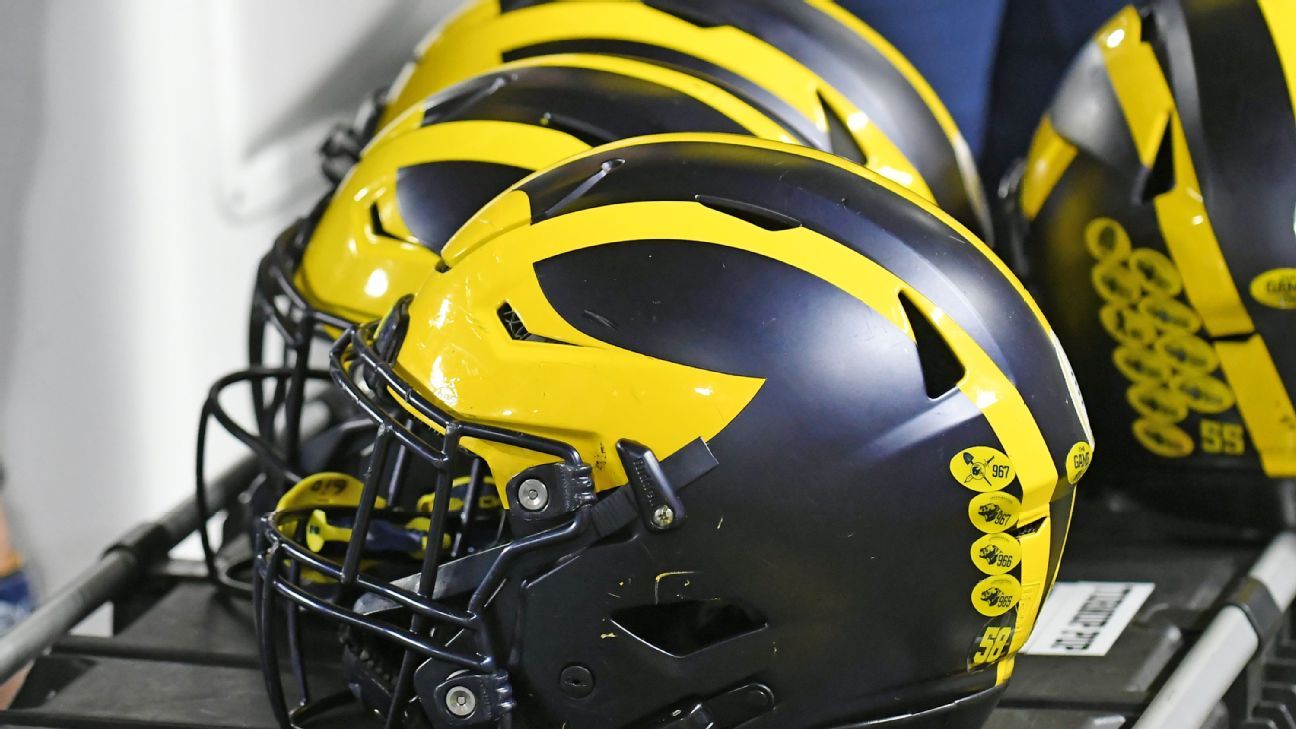Michigan‘s sudden change in how it was approaching the Big Ten’s ongoing suspension of football coach Jim Harbaugh in the past several days coincided with two new significant developments in the NCAA’s ongoing investigation into the Wolverines’ alleged cheating scheme, according to sources familiar with the situation.
Harbaugh and the university were preparing during the first half of the week to challenge the Big Ten’s right to suspend the coach via a restraining order and civil lawsuit filed in state court. On Thursday, the school’s lawsuit was voluntarily dismissed with prejudice — meaning it cannot be reintroduced in the future. The following morning, Michigan fired linebackers coach Chris Partridge.
Multiple sources told ESPN the NCAA informed Michigan this week it had obtained evidence suggesting that a university booster helped fund the impermissible sign-stealing operation run by former staff member Connor Stalions. Michigan also received evidence that suggested Partridge was tampering with the ongoing investigation.
After striking a consistently defiant stance and pursuing litigation last Friday, Michigan withdrew its legal complaint the night before a scheduled hearing on Thursday and accepted the Big Ten’s full three-game suspension of Harbaugh.
Sources told ESPN that university leadership this week has shifted its tone from the stern rebuke of the league’s sanctions to a growing acceptance that the football program might be dealing with significant NCAA infractions that could include a failure to properly monitor the program on Harbaugh’s part.
Both Michigan and the Big Ten have said there is no evidence yet that suggests Harbaugh had direct knowledge of the alleged sign-stealing scheme. The investigation remains in its early stages with several key figures yet to be interviewed.
Less than a week ago, Michigan athletic director Warde Manuel said in a statement that he believed the Big Ten’s decision to suspend Harbaugh was “unethical, insulting to a well-established process within the NCAA, and an assault on the rights of everyone (especially in the Big Ten) to be judged by a fair and complete investigation.”
University president Santa Ono also urged conference commissioner Tony Petitti in a letter not to succumb to pressure from other schools in a “rush to judgment.” He later publicly commended the football team for how it responded to “challenges and adversity” with conviction after Michigan’s win over Penn State last Saturday.
In a 13-page letter explaining his decision to sanction Michigan, Petitti pushed back against the university’s assertion that the Big Ten was denying Harbaugh due process. Petitti met with Ono a week before doling out any discipline and also provided Michigan a chance to respond to a formal notice that a punishment might be coming, which follows the Big Ten’s procedure for employing its sportsmanship policy to sanction a school.
The letter outlined the evidence Petitti said he had personally seen that led him to believe there was “an organized and extensive in-person, off campus advanced scouting scheme” at Michigan, and said Stalions was in “close communication with at least some of the coaches on the University’s football team.”
Petitti also added in the letter that there was “significant new information from interviews that the University attended” but that he could not share publicly because of the NCAA’s confidentiality rules.
On Thursday night, the school said it had accepted Harbaugh’s three-game suspension in full “to return the focus to our student-athletes and their performance on the field.” Neither Manuel nor Ono has made a public statement since the school announced its decision to drop the lawsuit other than Manuel’s brief statement announcing the decision to part ways with Partridge.
Michigan did say in multiple statements late this week that the Big Ten had agreed to “close its investigation” into the program. The Big Ten did not have an open investigation into the program this week.
And on Friday, another statement from the school released shortly after Partridge was fired said the university would “continue to take appropriate actions, including disciplinary measures, based on information we obtain.” The statement said it could not comment in more detail about Partridge’s departure due to employee privacy laws.
According to a source, Partridge was fired in part because of some of the conversations he had with players and other members of the staff about the NCAA’s ongoing investigation. The NCAA and its members typically tell their employees not to talk about ongoing investigations.
A separate source told ESPN that Partridge might have tried to obstruct the investigation further by destroying potential evidence. Yahoo Sports first reported allegations that Partridge destroyed evidence.
His termination letter, obtained by ESPN through a source, said the university “received evidence that you have failed to abide by the university directive not to discuss an ongoing NCAA investigation with anyone associated with the Michigan football program or others and as a result has determined that you have failed to satisfactorily perform your duties.”
A Michigan source told ESPN that there is no evidence yet that shows Partridge participated directly in Stalions’ sign-stealing operation, only that he interfered with the NCAA’s investigation.
The NCAA’s investigation is not expected to conclude until after the end of the college football season. Michigan confirmed that Harbaugh traveled with the team for this Saturday’s game at Maryland, but he will not be present at the stadium.
